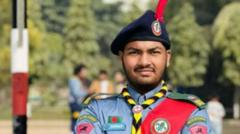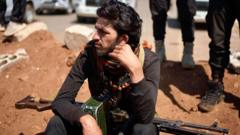As Syria transitions out of a prolonged civil war, a group of foreign fighters who previously battled against the Assad regime now seek roles within the new military framework, challenging international perceptions and U.S. foreign policy.**
Foreign Fighters At the Forefront of Syria's New Military Landscape**

Foreign Fighters At the Forefront of Syria's New Military Landscape**
Navigating an evolving narrative, foreign fighters who aided in the ousting of Bashar al-Assad are now pivotal players in Syria's military restructuring.**
In the aftermath of Syria's devastating civil war, foreign fighters play a surprising and contentious role in the country's military reintegration process. Having initially come to Syria to support rebel factions opposing Bashar al-Assad, these individuals are now being incorporated into the freshly formed army under the leadership of Syria’s new president, Ahmed al-Shara.
Since the uprising began in 2011, thousands of foreign nationals traveled to Syria to join various rebel groups, contributing significantly to the fight that ultimately led to the ousting of Assad in December. For the new leadership, these fighters have been characterized as loyal allies who remained committed to the Syrian "revolution." However, this portrayal stands in stark contrast to the U.S. government's ongoing concerns, which often equate the presence of foreign combatants with extremist affiliations, including ties to groups like the Islamic State.
With a reconstruction phase underway, the Syrian government is embarking on the task of rebuilding its military apparatus. Reports indicate that some foreign fighters will be integrated alongside native Syrian soldiers, prompting a complex discourse on loyalty and diplomacy. American officials have voiced their unease, suggesting that measures might be taken to marginalize these fighters or prevent them from obtaining key roles within military and governmental spheres.
President al-Shara, who previously led an Islamist rebel faction, now faces the dual challenge of honoring commitments to the foreign fighters who aided in the uprising while simultaneously re-engaging with international allies seeing this integration as problematic. As the situation unfolds, the balance between domestic priorities and external diplomatic relations will likely shape Syria’s emerging political landscape for years to come.

















